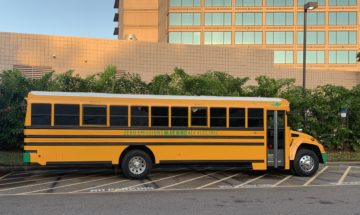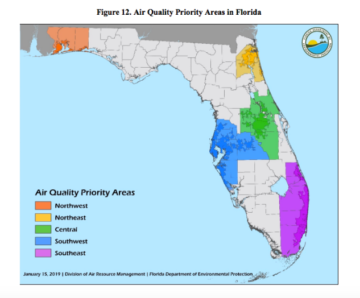On October 8, 2019, the Florida Department of Environmental Protection (DEP) released its Final Beneficiary Mitigation Plan, outlining how Florida’s $166 million portion in Volkswagen Dieselgate funds will be spent.
Dory Larsen | October 14, 2019 | Clean Transportation, Electric Vehicles, Florida On October 8, 2019, the Florida Department of Environmental Protection (DEP) released its Final Beneficiary Mitigation Plan, outlining how at Florida’s $166 million portion in Volkswagen Dieselgate funds will be spent. Similar to how the funds were allocated in the initial draft, this announcement outlines the three eligible mitigation actions:
On October 8, 2019, the Florida Department of Environmental Protection (DEP) released its Final Beneficiary Mitigation Plan, outlining how at Florida’s $166 million portion in Volkswagen Dieselgate funds will be spent. Similar to how the funds were allocated in the initial draft, this announcement outlines the three eligible mitigation actions:
- Bus Replacement Initiative Request for Information (RFI) – 70%, or $116.4 million for school, transit, and shuttle bus replacements;
- Electric Vehicle Charging Infrastructure Initiative RFI – Maximum allowed 15%, or $24.9 million for EV installation; and
- Diesel Emissions Reduction Act (DERA) Initiative RFI – 15%, or $24.9 million, for continued administration of the Environmental Protection Agency’s DERA State Grant Program.
The overall goal is to improve air quality and mitigate the impacts of the pollution caused by Volkswagen’s vehicles. Using these funds to transition polluting diesel buses to electric ones and increasing the build-out of the electric vehicle charging network are two critical steps towards that goal and we’re pleased to see that Florida appears to be taking the necessary steps to implement them.
Funding Opportunity: Electric School Bus Project – Initial Phase
 In the initial phase, DEP is making available $5 million dollars to replace old diesel school buses with electric school buses which is a step in the right direction. Florida public school districts may apply for up to 100% cost-reimbursement from DEP for the replacement of 2009 or older diesel school buses with new electric battery-powered school buses and associated charging infrastructure, including the costs to install the infrastructure. Funding will be provided on a first-come, first-served basis, and school districts within an Air Quality Priority Area designated in the Mitigation Plan are eligible for this initial phase. It will help determine best practices.
In the initial phase, DEP is making available $5 million dollars to replace old diesel school buses with electric school buses which is a step in the right direction. Florida public school districts may apply for up to 100% cost-reimbursement from DEP for the replacement of 2009 or older diesel school buses with new electric battery-powered school buses and associated charging infrastructure, including the costs to install the infrastructure. Funding will be provided on a first-come, first-served basis, and school districts within an Air Quality Priority Area designated in the Mitigation Plan are eligible for this initial phase. It will help determine best practices.
Interested school districts are encouraged to fill out the worksheet, and submit via email to VWMitigation@FloridaDEP.gov. Projects will be prioritized by reduction of emissions, so it is important to fill the worksheet in as accurately as possible so that DEP can calculate those estimated emission reductions.
Requests for Information
In addition to publishing the Final Plan and requesting applications for School Bus Projects (Initial Phase), DEP issued three separate Requests for Information (RFI) to address the three components of the plan. The RFIs are not applications for funding, rather they are a way to develop the process for identifying and determining funding for future projects. The three RFIs are available for a period of 30 days and expire on November 7, 2019, at 5:00 PM, E.T.
School, Transit and Shuttle Bus RFI
The bus RFI seeks to inform future bus projects. This RFI will help determine what agencies, school districts, transit authorities, cities and counties are interested in submitting future projects and where across the state the interest is greatest. All interested parties are encouraged to participate by completing the RFI which will help inform the scope and timeline for upcoming funding opportunities. For more information or to begin the RFI, click here.
Light-Duty Electric Vehicle Charging Infrastructure
DEP is requesting information from those parties (both governmental and non-governmental) who are interested in installing charging infrastructure. Like with the school bus RFI, participation does not guarantee funding nor does lack of participation preclude a project from being selected in the future. The RFI is designed to help guide future projects and establish a timeline for projects. DEP has established maximum cost-share amounts and will set the actual cost-share after the RFI has closed.
Diesel Emissions Reduction Act – DERA
The third RFI pertains to replacing eligible diesel engines with more efficient diesel vehicles. While bus replacements do qualify under DERA, DEP will focus on funding bus projects through the dedicated bus mitigation action first. The RFI for the DERA projects can be accessed here.
SACE is pleased that Governor DeSantis has chosen to highlight the importance of electrification efforts in his statement regarding the DEP Final Mitigation Plan announcement:
“My administration is committed to making smart investments to help improve our state’s air quality long-term,” said Governor DeSantis. “This funding will allow us to focus on projects that will reduce harmful emissions, help modernize school and transit bus fleets, and provide access to charging stations in our state as electric vehicle usage continues to increase.”
Although Florida was the last state in the union to release a Draft Beneficiary Mitigation plan, it seems decision-makers here have been weighing what other states have done well and listened to feedback indicating Floridians have a clear preference for electrification in order to create a final plan that will result in the most reduced pollution and drive us into the future. To read more about the plan visit the DEP’s Diesel Mitigation Program’s webpage, here.
Tampa Bay Clean Cities Coalition in conjunction with other state Clean Cities Coalitions and Florida DEP will host a webinar on the State of Florida’s Draft Beneficiary Mitigation Plan (VW) on Tuesday, October 15, 2019, from 12 to 1 pm (ET). To join the webcast: https://cutr.adobeconnect.com/cutrwebcast/ OR to all in Toll-free: (800) 832-0736 | Room Number: 6889609#. For those unable to attend, the webinar will be recorded and available at www.cutr.usf.edu. Central Florida Clean Cities Coalition has a page devoted to the VW Settlement if you are interested in learning more.
Please email questions about the VW Settlement process to Dory Larsen at SACE. To learn more about SACE’s electric transportation work please visit electrifythesouth.org.